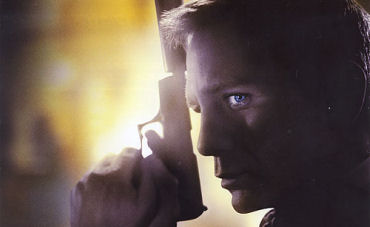I wasn’t invited to Wednesday night’s Westwood screening of Casino Royale (a kind of punishment, I presume, for having dissed Sony’s magnetic fall trio — Marie Antoinette, Stranger Than Fiction, Running With Scissors — with too much vigor) but Variety‘s Todd McCarthy attended, and he obviously sped home and speed-wrote his rave review and had it posted hours later.

And he’s made two encouraging proclamations — Daniel Craig is the studliest, most Ian Fleming-esque Bond since Sean Connery, and that the film’s low-tech, somewhat underproduced quality is very agreeable thing. For 007 purists, at least.
“Casino Royale is the first Bond in a while that’s not over-produced and is all the better for it [with] the fabled series” having been “invigorated by going back to basics,” McCarthy declares. “It’s comparatively low-tech, with the intense fights mostly conducted up close and personally, the killings accomplished by hand or gun, and without an invisible car in evidence.”
Moreoever, “there can be little argument that Craig comes closer to Ian Fleming’s original conception of this exceptionally long-lived male fantasy figure than anyone since early Connery. Casino Royale sees Bond himself recharged with fresh toughness and arrogance, along with balancing hints of sadism and humanity.
Bond, he writes, “is more of a lone wolf” this time out. “Craig’s upper-body hunkiness and mildly squashed facial features giving him the air of a boxer; 007’s got a frequently remarked upon ego, which can cause him to recklessly overreach and botch things, and the limited witticisms function naturally within the characters’ interchanges.
The notorious gonad-squeezing, scrotum-tugging scene is a stand-out, apparently. “Constrained nude to a bottomed-out chair, Bond is tortured as Mads Mikkelsen‘s Le Chiffre repeatedly launches a hard-tipped rope upon his nemesis’ most sensitive area, and Craig once and for all claims the character as his own by virtue of the supremely cocky defiance with which he taunts Le Chiffre even in vulnerable extremis.”
On top of which the dialogue, says Mccarthy, “requires Bond to acknowledge his mistakes and reflect on the soul-killing nature of his job, [and therefore delivers a] self-searching [that’s] unimaginable in the more fanciful Bond universes inhabited by Pierce Brosnan and Roger Moore.”









